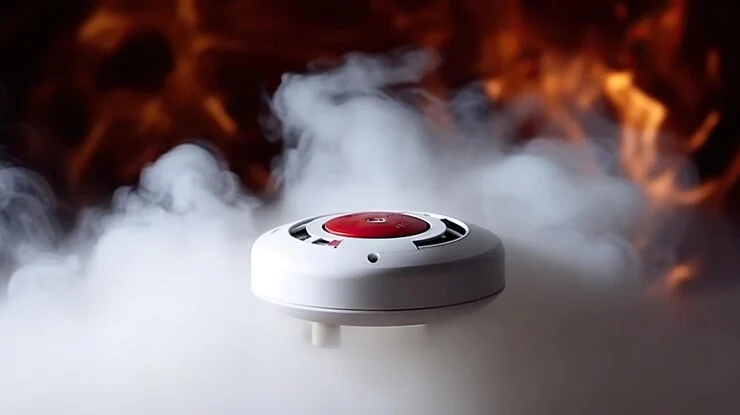The most essential part of a fire alarm system is the smoke detector. This tool prompts you to do something immediately. Home is the safe tab when there is a system alert. A smoke detector is useless without an alert. Both of these types are useful. Battery-based and hard-wired systems. Both work in different ways. The battery is portable only. The hardwired hot is connected to the power supply.
This has to be decided at the time of installation of the house. Each model has its advantages and disadvantages. Whether you are alone or with a family, an alert system is essential. Early warning can save your life. Fire warning if received early. Choosing the right smoke detector is very important. In this article we will compare both. Each feature is explained in detail.
Choosing the best option for your home will be easy. The security system should be strong. It is not only part of the law but also a life saver. The function of a smoke detector is simple. But choosing a model is difficult. Every home layout is different. Hence proper planning is essential. Every room should have coverage. One device alone does not help.
Battery Smoke Detector – Features
The battery based smoke detector is compact and lightweight. Easy install available. No electrical wires were required. You can install it yourself. It seems to be fixed with a ladder and screws. It is portable and easy to remove. If you want to move it will be easy. It is perfect in an apartment or rental house. Battery cells last longer. A 9 volt or AA battery is used. The alert system remains active with smoke detection.
Only the battery is weak enough to give a signal. Maintenance was easy. There were no problems with any wires or fuses. But sometimes the battery is forgotten. Renewal did not happen on time. The alert system appears to be weak. The fire signal was received late. Hence a monthly battery test is essential. A low battery tone should be checked. A backup battery should be ready.
A portable system is perfect for short term use. Vacation or travel helps at home. The wireless model is simple. Never needed a cable. But caution should be exercised for long-term safety. Battery time is limited. A charger or cell should always be ready. The system should not fail in emergency situations.

Hardwired Detector – Features
A hardwired detector is connected to an electrical wire. It is connected to the main power of the house. It also has a backup battery. The alert works even when there is a power outage. Wiring professionally installed. System planning is done while building a house. Its system is more durable. The alert system is reliable and robust. Multiple detectors can be connected to the network. If a fire breaks out in one room, a signal is sent to other rooms as well. It has a test button and an LED light.
Monthly check made easy. The alarm is loud and clear. A quick beep sounds when smoke is detected. The battery switch is activated when there is a power failure. Knowledge of wiring is a must in this model. Difficult to install yourself. Costs are increasing. But security has also increased. A system reset option is also available. The fire drill test is simple.
It is compatible with smart systems. Can be connected via Wi-Fi and app. Alarm records are also saved. Works with home automation. But installation in an old home is expensive. Maintenance is done professionally. The help of a fire expert is essential.
Comparison – Which is better?
A battery model is best if you are in a rental house. Low cost and easy fit. It’s easy to handle yourself. Can be carried while moving. But if you are in your own home then a hardwired model is better. Power Connect and a strong alert system are great. The network system covers the entire home. Monthly test was easy. It is more reliable for long-term use. The battery model provides a low-budget solution.

The hardwired model is a one-time investment. It is important to warn everyone in emergency situations. But the wired system also provides smart features. You can also manage through the app. Both should have a backup battery. Delay in fire safety is dangerous. The size and layout of your home is important. If you live in a small flat a battery system will do. If it is a double story house, a wired system is best. Safety should not be compromised. Time for warning matters. Smart detectors are useful in smart homes. You can get notifications on your phone. Regular tests should be done. Whichever model you choose depends on the location.
Frequently Asked Questions
Q1: How often should the battery model be tested?
The battery system should be tested monthly. Press the test button and check the smoke alarm sound. If the sound becomes weak, replace the battery. The system must work properly in every room. Delay in fire alert may be due to smoke ban. It is also important to have a backup battery ready. A low battery tone should not be ignored. The device is always active through a monthly check.
Q2: Should every room have a hardwired detector?
Yes, Coverage of every room is essential. There should be an alarm in the bedroom, lounge, kitchen and basement. A fire can start anywhere. If the system is in each zone, an early alert is received. Hallways and stairs should also be covered. Every corner of the house should be safe. The system becomes powerful by connecting multiple units.
Q3: How often does the battery system need to be replaced?
Battery cells should be replaced every 6 months. But check even if usage is more than 3 months. A weak battery may fail in an emergency, especially during smoke detection. The system has given a low power alert. Don’t delay our time. Installing a new battery is easy and safe. The backup battery box must always be full.
Q4: Does a hardwired system fail during a power cut?
No. Battery backup is hardwired into the detector. When the power is cut off, the system shifts to battery. The alert remains active. Therefore, check the battery status also monthly. If the backup battery runs out the alert will be of no use. The dual system has always been reliable. There should be a balance between power and battery.
Q5: Are smart alarms reliable?
Yes, Smart Alarm provides advanced features. Control is possible through a mobile app. But the notification system of the app should be turned on. Keep background data enabled. WiFi signals should be strong. The warning is of no use if missed, especially in case of smoke. Keep updating the app. Also check the monthly report. Despite smart use, smart systems seem to fail.


